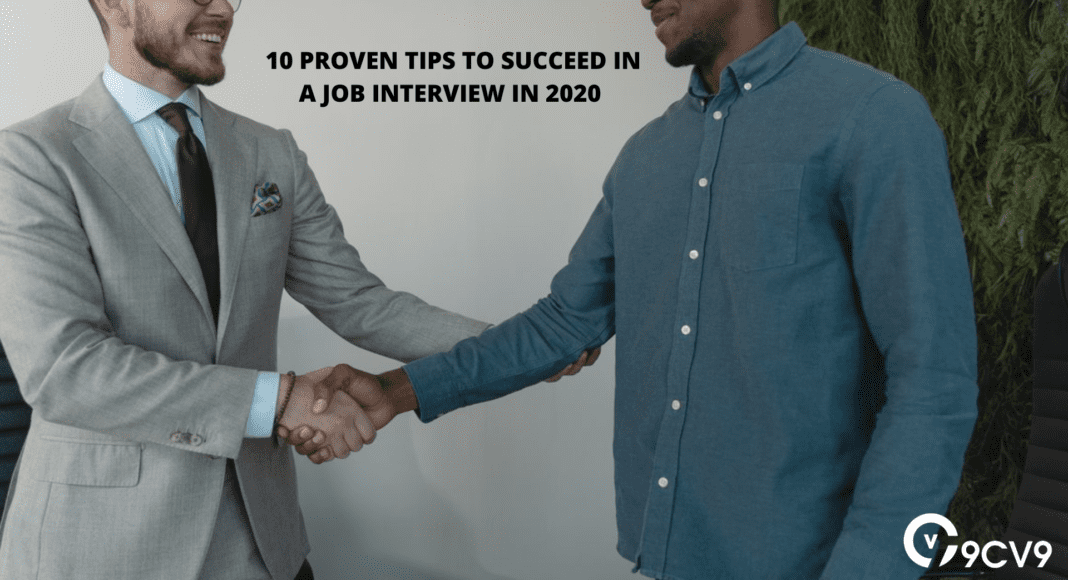As the interview day for your dream job draws near, you can’t help but feel nervous about it. Your heart is palpitating and your hands are shaking. You are feeling anxious about that incoming interview session. Whether you get that coveted job depends somewhat on how you perform during the make or break interview – one that could either get you that paycheck or kicked you back to the whole job search journey. Well, the bright side is even the most qualified and smartest people sometimes do undergo this baptism of fire – the need to prepare for an incoming interview.
Luckily, we have got you covered with our latest top 10 tips to help you succeed in your job interview in 2020.
These are the main snippets of this article:
- Do your research
- Prepare Your Selling Points
- Prepare for common questions
- Practice until you’re confident
- Dress appropriately
- The Body Language
- Communication
- The STAR method
- Be ready to handle inappropriate questions
- Ask smart questions to the interviewer
- One secret tip
In this article, we distinguish the recommendations between before and after the interview.
Before the interview
1. Do your research
Always do your homework before you go to an interview. It’s crucial to search about the company and the job. Some areas to research are the company’s history, previous employees, funding milestones, values, mission, and vision.
Knowing what the company values as its employee is crucial as that means you can position your interview questions and behaviors towards those values. For example, in a typical startup company, employees who are able to multi-task and don’t mind getting their hands dirty are characteristics appreciated highly by the founders or hiring managers. So, if you are interviewing for a job at a startup company, then it might be good to share some past scenarios exhibiting those values.
Next, knowing the key personnel, such as the executive team, i.e, C-level personnel would be useful. For example, if you know the CEO once studied or worked at your university or your past companies respectively, then casually mentioning it during the interview might increase your success percentage.
In this technological era, information sourcing and searching have never been easier. The company’s website, social media, and the latest press releases will help get a solid understanding of the company. One can head to Linkedin, or to do a simple Google search with the company keywords. Simply search for the company information related to current news, latest projects, financial stability, and how they treat their employees. At 9cv9, we have a company page with a trove of useful information such as description, benefits, jobs that the company is hiring for, reviews, and even funding milestones.
Other than knowing about the company, it’s good to know the type of interview as well. There are:
- The casual interview type whereby the objective is to get to know you as a person.
- The technical interview type whereby the objective is to test your technical skills needed for the job. Usually, this applies to programmers, engineer, developer, and designer jobs.
- The behavioural interview type whereby in addition to the usual interview questions, some behavioural and scenario-based questions will be asked. Usually, for these types of interview, there are no right or wrong answers. The aim of the interview is to form an understanding of your thought processes and whether there is a culture-fit between you and the company.
- The team interview type whereby in addition to you as an interview participant, there might be other interviewees joining the interview.
Further readings
- 7 Things to Research Before Any Job Interview
- How to Research a Company for a Job Interview
- 8 Things You MUST Learn About the Company, Before a Job Interview
2. Prepare your selling points
In other words, why should the company hire you? What makes you different from the sea of applicants for the job? To tackle this problem, think of two to five unique selling points in your mind revolving around your skillset, expertise, past experiences, etc. Thereafter, mention during the interview how these factors make you the best fit for the job. Sometimes, but not always, hobbies and pastimes can serve as differentiating points.
Another strategy is to share complementary skills to the job. For example, when interviewing for a business analyst job, whereby your main task is to analyze business data and infer certain trends or outcomes to the company, you might want to share that you have some coding skills as well. If you know how to code, you are able to create a program to automate certain parts of the business analysis process, which will add value to the company. In this scenario, the hiring manager will be hard-pressed not to hire you.
Further readings
- 5 ways to sell yourself in a job interview
- How to sell yourself in a job interview
- How to Sell Yourself During a Job Interview
3. Prepare for common job interview questions
Research on some common interview questions like, why shall we hire you? Where do you see yourself in the next five years? etc. and prepare the best answers for the ones most likely to relate to your interview. If it is a behavioural interview type, then some common questions would be
- Are there any instances when you failed to achieve your goals?
- When was the time you had to say “no” to someone?
- Have you ever had to disagree with your boss?
Further Readings
4. Practice until you are confident
As the saying goes, “Practice makes perfect”. To succeed well for your interview, practice on some sample interview questions (with the given links above) and some model answers beforehand. This should be done at least 2 days before the interview, so that your mind and body can have the time to assimilate those practices. Some ways to practise are:
- To do a mock interview session. Find a friend, sibling, or another family member to do this. You can do a mock interview with a camera phone so that when the interview ends, you can playback to see what areas you can improve on.
- Refer to our mock interview question list to get a sense of the types of interview questions and then brainstorm some possible answers to those questions. Imagine that an interviewer is in front of you and simulate answering those questions
Further readings
During the Interview
5. Dress appropriately for the interview – Overdress rather than under-dress
One of the key points to succeed in a job interview is the way you are dressed and groomed. Make sure to dress one level above the position you are applying for, to look a part of the company. If you are not sure about the dress code, reach out to the recruiter, ask, and dress accordingly. Moreover, make sure you have a fresh breath, trimmed nails, minimal perfume or cologne, and no body odour at all.
McNeely Family Dentistry recommends that you avoid certain food such as sugar, caffeine, alcohol, and foods like garlic as they can contribute to bad breath; brush and floss your teeth before the interview; avoid snacking before the interview especially in the waiting room; and chew a stick of sugarless gum shortly before you are called in for the interview, but make sure not to spit the gum in front of your interviewer.
In the event that you aren’t sure on the appropriate dress code, then it’s best to err on the side of caution by over-dressing, though that might backfire according to some observers.
“If you’re interviewing at a company known for their low maintenance dress code and company culture, showing up to your interview in a suit will show that you haven’t done your research on the company and the environment,” writes Michele Lando at Create & Cultivate
Thus, the best is to first do your homework on the company culture and ask on the dress code prior to the interview.
For remote interviews now, remember at least to dress in part for the camera. Career Sidekick mentioned to avoid clothing that is distracting or bright coloured. Try not to wear large earrings, don on a cap, or have obvious face piercings etc. It’s best to look professional, and not distracting to the interviewer.
Further readings
- How to dress right for an online job interview to make the best impression
- How to Dress for a Job Interview
- The Best Outfits for Job Interviews
6. The body language – Keep it formal
Your body language is all about how well do you demonstrate confidence by making eye contact, standing straight, and other well-mannered and polite body actions. From having a firm handshake at the start to thanking your interviewer at the end, every detail of your body actions can send a pleasant or unpleasant signal to the hiring manager. Remember, there is no second chance for the first or last impression, and those moments can become a great beginning or a quick ending to your job interview. Follow the 3 Cs approach, i.e., cool, calm, and confident in your body language.
Further readings
- Interview preparation: Body language during the interview
- 9 simple body language tips for your next interview
- 18 Body Language Tips to Remember During Your Next Interview
7. Communication
Good communication can lead you to the job you applied for. Listen and observe your interviewer. Match at the same pace and style. Mirror your interviewer. You may face some obstacles during online interviews due to current remote behavior like the unstable connection that makes you have challenges in listening to the interviewer. Here’s a tip: Don’t panic. Try to ask the interviewer to repeat the question in a good manner.
Further readings
- Communication tips for job interviews
- How to communicate effectively in a job interview
- 5 public speaking tricks that’ll help you talk your way to a new job
8. The STAR method
Use the STAR method. STAR stands for Situation, Task, Action, and Result. You can utilize this framework to tell your success stories that happened in the past.
Let’s start by thinking of an event that might impress the interviewer. Then, begin with the Situation. Here, you can start by describing the situation you were in. After that, you continue to explain the tasks you had to do. In this phase, the interviewer can get a glimpse of your story. Go on to describing the specific actions you took to do your task or how you overcome the problem you described in the situation stage previously. Lastly, close it with the result. Tell the interviewer what you achieved that time from the actions you took.
For example,
In my first year in X Company, I was in charge to manage a project. I was assigned to be the leader of 5 other people and we have to achieve the target to sell at a minimum of 450 products from July – August 2020. My job includes coordinating with the team so that we can achieve the group target. Unfortunately, there were conflicts in the team. My coworkers were irresponsible towards their job while we have a really tight deadline. So, I took the action to make a group meeting and communicate with the team about how we feel towards each other, how do we want to be treated as coworkers, and how do I can make them feel belong to the project. Turns out, that meeting was a very good decision. I, as the group leader, can behave just how my coworkers want me to behave. We also do bonding in order to increase our sense of belonging to each other so that we can work together in achieving our project target. As a result, in August 2020, we managed to sell 550 products that exceed the initial target.
Further readings
- How to Use STAR Method Technique for Interview Questions
- 30 Behavioral Interview Questions You Should Be Ready to Answer
- How to Use the STAR Interview Response Method
9. Be ready to handle inappropriate questions
During the interview, You may be asked some irrelevant questions such as your religion, caste, marriage, kids, etc. You can simply skip the question by saying honestly, “If I may, I would like to decline to answer on that question as it is rather sensitive to me” or answer it in a tricky way like, “I’m not sure to have kids in the future, but I surely cannot think about quitting.”
Further readings
- How to Handle Illegal (or Inappropriate) Interview Questions
- 8 Inappropriate Interview Questions and How To Tackle Them Like a Pro
10. Ask smart questions to the interviewer
In the end, the interviewer may ask if you have some questions. In the answer, just saying “no” gives the impression that you are not interested in the job. This will make the interviewer not to hire you, no matter how good you are. So, prepare some questions for the interviewer, such as:
- By which means and how often will my performance be measured?
- What are the day-to-day responsibilities of the job entails?
- How is the working culture in the company?
Further readings
Secret Tip: After the Interview
Send a thank-you email to the interviewer
And, to reward you for reading this far, we shall reveal one secret technique that only a few successful applicants employed to pass the interview with flying colours. This secret strategy can be useful to differentiate yourself from the other applicants. Most interviewees would let their hair down after the thank-you handshake at the end of the interview and unknowingly, forfeit the chance to make one final action to etch a lasting impression on the interviewer’s mind. If the job is hotly contested, then this tip can tip (pun not intended) the interview scales in your favour.
For samples on the thank-you email, please refer to The Perfect Template to Write a Thank You Email After an Interview (Plus Samples!)
Final parting words...
That’s it. With these 10 recommendations (plus one secret tip), your chance of succeeding in your next interview has dramatically improved since the first time you laid eyes on our article. By utilising these techniques, you are in a better position to succeed in your job interview, and one step closer to getting that coveted job.
Do let us know whether our tips and recommendations have been helpful or if you have other tips, do comment below in the comment box. We love to cheer with you when you pass your interview.
If you find this helpful, please do check out our other guides on CV/Resume, Cover Letters, and posting jobs online!































![Writing A Good CV [6 Tips To Improve Your CV] 6 Tips To Improve Your CV](https://blog.9cv9.com/wp-content/uploads/2020/06/2020-06-02-2-100x70.png)


